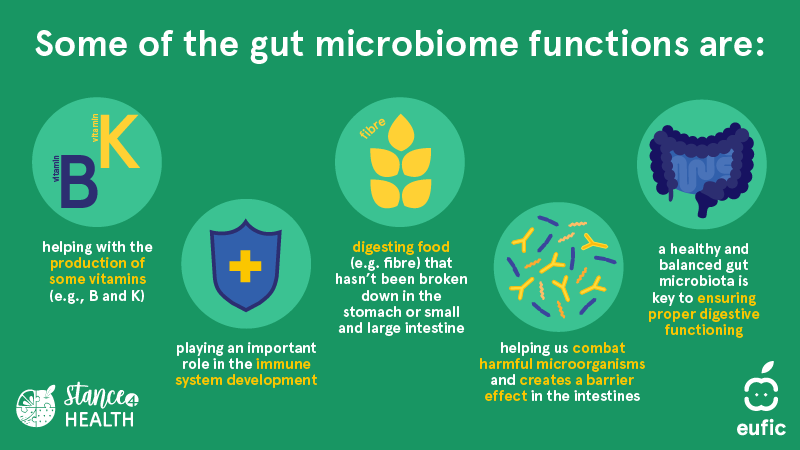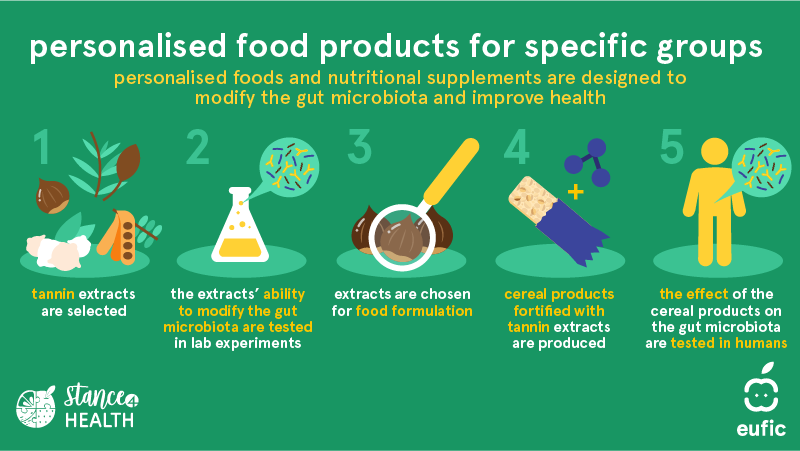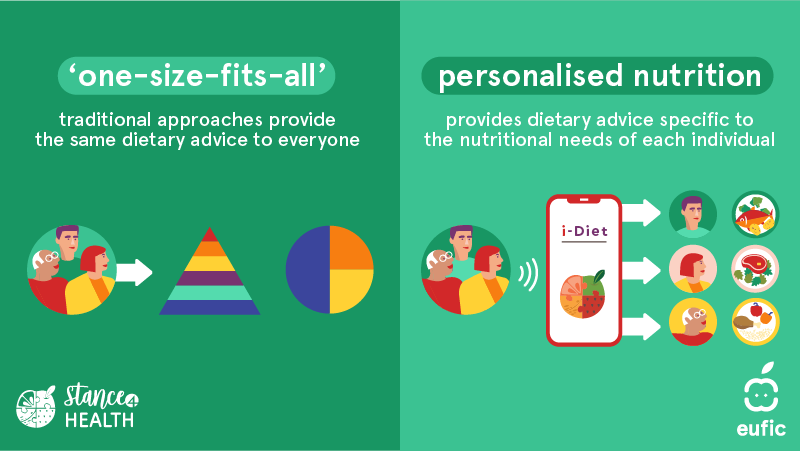Shaping the gut microbiome through personalised nutrition
Last Updated : 01 June 2023The gut microbiome is an essential part of our digestive system that plays a significant role in our overall health and well-being. This article will explain how personalised nutrition and functional foods are being studied as tools to positively influence our gut microbiome, as well as their limitations and challenges.
What is the gut microbiome?
The gut microbiome refers to the trillions of microorganisms (mainly bacteria, but also viruses, fungi, and other microorganisms) that reside in our digestive system and their interactions with each other and their surroundings. Although we tend to think of microorganisms as causing disease, many, including those found in our gut, are beneficial to the point that we can't survive without them. Among other functions, the gut microbiome is crucial to nutrient absorption, immune function, and maintaining a healthy gut.1

The gut microbiome feeds from what we eat and that cannot be completely digested by our human bodies. Some kinds of bacteria, for example, can “eat” carbohydrates that our digestive system is unable to break down (e.g. fibre). This process produces different chemical compounds that human cells can use for beneficial purposes, such as short-chain fatty acids (SCFAs), which are important for maintaining the health of the cells lining the gut, regulating the immune system and reducing inflammation.2 But there is a catch because not every microbe can feed from the same nutrients. Depending on what we eat (e.g. more carbohydrates or more proteins) we will favour certain microbes over others, changing the activity and composition of our microbiome.3
What is personalised nutrition?
Personalised nutrition is a tailored approach to diet and nutrition that considers an individual's specific dietary needs, preferences, and goals. It differs from traditional dietary recommendations, which are based on population-wide studies that identify generalisable associations between foods and human health.4
Personalised nutrition recognises that one-size-fits-all dietary guidelines may not be effective for everyone. Instead, a tailored approach can help people make better-informed dietary choices that align with their individual needs and goals. The aim is thus to offer a particular diet for each person that considers biological data such as genetics, age, weight, and gender, as well as nutritional status, food preferences, allergies or intolerances, and cultural, religious, and social factors. By combining this information with technological advances, such as genetic testing and wearable devices, personalised nutrition aims to deliver tailored dietary advice that is both effective and practical for each person, ultimately making it easier for them to stick to healthy eating habits over the long term.5

When it comes to the gut microbiome, various factors influence its composition and functioning, including diet, genetics and lifestyle. Personalised nutrition can be used to influence the composition of species present by promoting the growth of beneficial bacteria through the consumption of specific nutrients and bioactive compounds. These can be found in foods like fruits and vegetables, but also in what are called "functional foods".
What are functional foods and how do they influence our gut microbiome?
Functional foods are a category of products developed to promote specific health benefits. These foods typically contain bioactive compounds, such as antioxidants or prebiotics, that have been shown to promote health in different ways. Functional foods can include fortified foods foods, such as breakfast cereals and fruit juices, and naturally occurring foods, such as berries, nuts, and oily fish.6
The health claims associated with functional foods are based on scientific evidence and subject to regulatory approval. In the European Union, the regulation also requires that functional foods be labelled appropriately, with clear and accurate information about their nutritional and functional properties. For example, yoghurts containing probiotics can include statements such as “contains live and active cultures that support digestive health” or “may help strengthen your body’s natural defenses”. Another example is fortified cereals with certain vitamins and minerals, such as iron and vitamin D, which may use health claims such as “a good source of vitamin D, which is essential for healthy bones”.7,8
Shaping the gut microbiome through functional foods
Functional foods can play an important role in personalised nutrition by promoting the growth of beneficial gut bacteria. For instance, tannins, a group of bioactive compounds present in some fruits and vegetables, such as grapes, berries, or pomegranates, have been shown to encourage the growth of healthy gut bacteria through studies carried out by the EU project Stance4Health. You might know about them due to their astringent taste, the dry and puckering sensation felt in the mouth when consuming certain foods and beverages like red wine or tea. Plants produce tannins as a natural defense mechanism against predators such as insects, fungi, and bacteria. In addition to this function, tannins have been found to possess antimicrobial properties, helping to prevent the growth and spread of certain types of bacteria and fungi.
Recent lab-based research by the Stance4Health project suggests that the enrichment of foods with tannin extracts could positively influence the gut microbiota, potentially promoting health. When humans consume tannins, they are not broken down completely during digestion, and some can reach the large intestine. There, they become a food source for beneficial gut bacteria, acting as a prebiotic and potentially promoting gut health.9 The project has developed a range of biscuits and supplements containing tannins and other compounds that can positively influence the gut microbiome.

Limitations and challenges of personalised nutrition
While personalised nutrition can be a valuable tool to promote health and well-being through diet and shaping the gut microbiome, there are several limitations and challenges to consider. Firstly, the field of gut microbiome research is still in its early stages, and we have much to learn about the complex interactions between diet, gut microbiome, and overall health. Secondly, the commercialisation of personalised nutrition can be problematic, as it may prioritise profit over health outcomes. It's important to remember that no single functional food can replace a balanced and varied diet. Personalised nutrition services should be evidence-based and provide accurate, unbiased information to consumers.10
Another important aspect to consider is the ethical implications. Genetic information is sensitive, and other data provided by consumers, such as gender, socioeconomic status, and religious beliefs, must also be protected. Therefore, personalised nutrition requires a legal and ethical regulatory framework to ensure consumer protection. This is important because for consumers to feel safe when using personalised nutrition services, it is essential to establish standards and guidelines for data privacy, informed consent, and transparency.5
Conclusion
The gut microbiome plays a vital role in our overall health and well-being, and personalised nutrition can be a valuable tool for shaping the gut microbiome. By incorporating functional foods into our diets, we can potentially positively influence the growth of beneficial bacteria in our gut. However, it's important to remember that personalised nutrition should be used in conjunction with a balanced and varied diet and that more research is needed to fully understand the relationship between diet, the gut microbiome, and overall health.
 This article was produced in collaboration with Stance4Health. Stance4Health has received funding from the European Union’s Horizon 2020 Research and Innovation programme under Grant Agreement No. 816303.
This article was produced in collaboration with Stance4Health. Stance4Health has received funding from the European Union’s Horizon 2020 Research and Innovation programme under Grant Agreement No. 816303.
References
- Ding RX, et al. (2019). Revisit gut microbiota and its impact on human health and disease. Journal of Food and Drug Analysis 27(3):623-631.
- Rinninella E, et al. (2019). What is the Healthy Gut Microbiota Composition? A Changing Ecosystem across Age, Environment, Diet, and Diseases. Microorganisms 7(1), 14.
- Aguirre M, et al. (2016). Diet drives quick changes in the metabolic activity and composition of human gut microbiota in a validated in vitro gut model. Research in Microbiology 167(2):114-125.
- Ordovas JM, et al. (2018). Personalised nutrition and health. BMJ (Clinical research ed.) 361:bmj.k2173.
- Stance4Health website, Smart Personalised Nutrition. Retrieved May 1, 2023.
- Hasler CM (2002). Functional Foods: Benefits, Concerns and Challenges—A Position Paper from the American Council on Science and Health. The Journal of Nutrition 132(12):3772-3781.
- European Commission website, Questions and Answers on the list of Permitted Health Claims. Retrieved May 11, 2023.
- European Commission website, EU Register on nutrition and health claims. Retrieved May 11, 2023.
- Molino S, et al. (2021). Enrichment of Food With Tannin Extracts Promotes Healthy Changes in the Human Gut Microbiota. Frontiers in Microbiology 12.
- Verma M, et al. (2018). Challenges in Personalized Nutrition and Health. Frontiers in Nutrition, 5.




